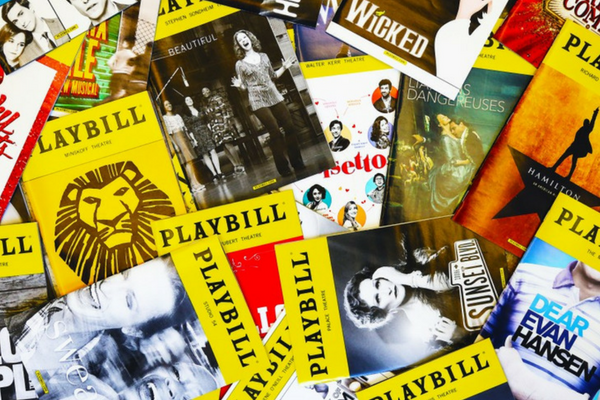There has been a long-standing argument that audiences should know exactly who they are seeing perform each night. In England, most shows sell programmes and a lot have up to date cast information on display somewhere within the theatre, normally in the front of house or sometimes on a printed slip inside the programme.
In America, shows have playbills which show the cast for that night. These are given free to audience members, therefore, ensuring that the audience knows who is performing. A substantial amount of people want to see playbills, like used on Broadway, introduced to English theatres – particularly the West End...
In England, theatre programmes date as far back as the 18th century. Despite the fact that at that time most of the theatre’s audiences were illiterate they still thought it was important to recognise who was on stage. So much so that the programmes were given out at the theatre and even outside on the streets. Programmes similar to what we have now started to be printed in the 19th century. During the Second World War, with paper rationing, the programme became a single sheet of paper but in the 1970’s photo printed programmes became widely available and distributed at British theatres. This tradition has continued. Most programmes consist of photographs, cast and creative information, a synopsis of the show and often interviews with the producers/directors with a few adverts included to keep down the costs. They are often collected and stored in their dozens by admiring fans of shows and kept as souvenirs.
During the Second World War, with paper rationing, the programme became a single sheet of paper.
In Broadway, however, playbills are given out at each performance to show the cast and creative team. These are often black and white and simply list the cast and creative team involved. Playbills are provided free of charge and are funded by the advertisements inside which means there are a lot of adverts within the thin booklet. There are also interviews and news about Broadway in general. Normally they are given out one per ticket, which does result in everyone knowing the cast but also means that there are a lot of discarded booklets left in the theatre afterwards. Surely this is great for the cast as the audience know who is performing but is it so good for the environment? In an age where most things are going digital, do we really need more paper being wasted?
The positive thing about Broadway’s playbills is that it gives the chance for all audience members to find out who is on stage.
The positive thing about Broadway’s playbills is that it gives the chance for all audience members to find out who is on stage. All performers and creatives have worked extremely hard to produce the final piece of theatre and deserve to be recognised for this. However, with the internet becoming so easy to navigate and use, most people now are capable of looking it up in seconds on the show’s website and seeing colour photographs, press photographs and detailed information about the cast and creative. In fact, if you look around the auditorium before the show and during the interval, you are likely to see more people on phones than not. So are playbills really necessary?
London theatres often sell cheaper programmes, which still have a lot of detail about the cast and creatives and some photographs, and more and more shows now also produce glossy souvenir programmes to keep. These are full of shiny press photographs and information about the show, often including interviews (these are also sold at most shows on Broadway for a fee). Audience members are not required to buy them which means that there is no obligation and far less paper wastage. For a lot of people, these become a collectors hobby and many fans of productions enjoy purchasing programmes to treasure and love the possibility of getting it signed at
Audience members are not required to buy them which means that there is no obligation and far less paper wastage.
At the end of the day, whether you want to buy a glossy programme to keep or pick up a free playbill with your ticket, more and more people are referring to the internet to find out about the cast. After all, most people buy tickets online and often find out about the shows this way too so clearly there is not as much of a demand for programmes (other than as a souvenir) as before. There are also some fantastic websites and twitter accounts such as @westendunderstudies who inform the audience of any covers, standbys and understudies taking performing during each show. It is vital that theatres inform audiences of who is performing, whether this is via posters on the doors, a digital display in the foyer or an announcement being made at the start of the show. Audiences need to know who is performing for them and performers deserve to be recognised and appreciated for their hard work.
So, should the West End introduce free playbill style leaflets? Would this be feasible economically? Do theatregoers need/want a leaflet which may well end up in the bin when they could just look it up on their phone/smart device? What’s your opinion on this topic?

